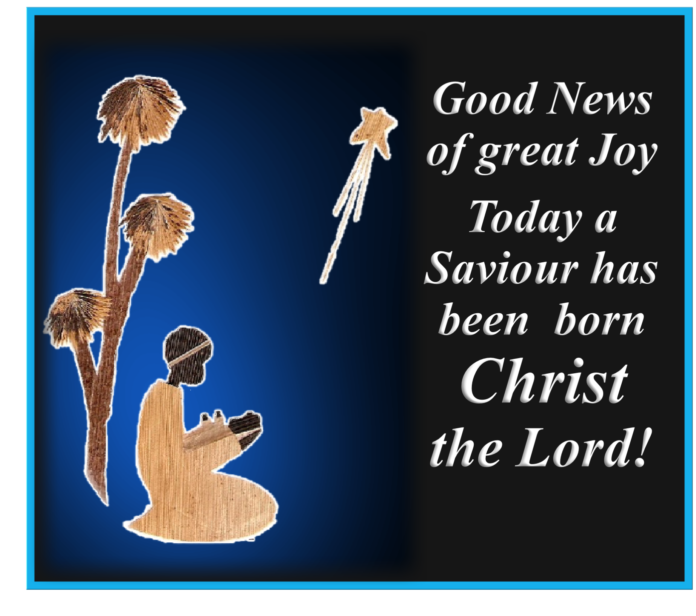25 December 2021
Isaiah 52: 7-10 Hebrews 1:1-6 John 1: 1-18
Theme: The Word was made flesh
I’m sure many of you will have read, or at least heard of, James Redfield’s popular novel, The Celestine Prophesy. A classic example of New Age Spirituality, first published in 1993, it clearly struck a chord with many people disillusioned with Institutional Christianity and searching for meaning in their lives. It became a runaway bestseller, being translated into 34 languages and selling 23 million copies worldwide. At a time of gloom and confusion, The Celestine Prophesy seemed to tune into positive spiritual energies in the world around us and within us. However, the claims made for the novel in the blurb were fantastic: ‘a story that comes along just once in a lifetime to change lives forever’. The Celestine Prophesy does not live up to these claims. It is not the answer to the meaning of our lives. That is to be found in the Christmas story that we are celebrating today.
Christmas is a story about a New Age in human history, an age that arrived more than 2,000 years ago in the little town of Bethlehem with the birth of Mary’s child. This was an epoch-changing event heralded by angels: ‘I proclaim to you good news of great joy that will be for all the people. For today in the city of David a Saviour has been born for you who is Christ the Lord’ (Lk 2: 10-11). Today, we celebrate the moment for which we have been waiting and preparing over the past four weeks – the birthday of our Saviour, Jesus Christ. We celebrate it with joyful acclaim because this was indeed a moment that changed history, bringing us a sure and unfailing hope, a hope based on God becoming one with us, becoming Emmanuel (God-with-us).
Today’s liturgy pulsates with a joy that resonates throughout the universe. The first reading from the prophet Isaiah calls on the ruined city of Jerusalem to ‘break into shouts of joy’ because the liberator is at hand: ‘The Lord bares his holy arm in the sight of the nations, and all the ends of the earth shall see the salvation of our God’ (Is 52:10). The salvation Isaiah is referring to is not a purely spiritual or other-worldly reality. It is not about going to heaven when our life on earth is ended. No! It involves the integral transformation of the lives of the oppressed people of Israel in the here and now. It is God coming to establish his reign among them, bringing happiness and peace. The responsorial psalm extends the call to rejoice to the whole world: ‘Shout to the Lord, all the earth, ring out your joy … for the Lord has worked wonders… he has shown his justice to the nations (Psalm 97). The second reading also underlines the universality of what God has done in sending us his Son, ‘the radiant light of his glory and the copy of his nature’, whom ‘he has appointed to inherit everything and through whom he made everything that is’ (Heb 1:3).
Our gospel reading is the famous prologue of John’s Gospel. It situates the birth of Jesus against the cosmic backdrop of the birthing of the universe. The baby born in Bethlehem is the eternal Word who was with God in the beginning and through whom everything that exists came to be. Then, in simple words of awesome beauty, John captures the moment the infinite weds the finite, uniting in an historical being divine light and love: ‘The Word became flesh, he lived among us, and we saw his glory, the glory that is his as the only Son of the Father, full of grace and truth’ (Jn 1:15).
As we gaze in wonder upon the nativity scene, represented in the Christmas crib, we see the Lord of the universe as a tiny vulnerable baby totally dependent on his mother for his every need. Becoming one with us, the eternal Word became subject to the joys and pains to which all human flesh is heir: to the joy of loving parents, of friendship, of play and laughter, of song and dance; but also to hunger and thirst, grief and sadness. He would come to know the joy of bringing healing and hope to the crippled, the blind, the dumb, and those living on the peripheries of society. He would experience the pain of ingratitude and rejection, including the misunderstanding of even his closest disciples. He would also know fear when faced with the hostility of those who sought to destroy him. Finally, he would endure the unspeakable agony of a shameful death on a Cross – and all this to manifest the Father’s unfailing love for us and to show us what it really means to be human.
The Christmas story recalls the birth of this unique person, the incarnate Son of God, who didn’t just tell us how to live but showed us, through his tears, sweat and blood. The Christmas story challenges us to reflect on the life of Jesus so that we enter into the immense mystery of the love of God and discover the meaning and purpose of our lives and share it with others. As we celebrate his birth this Christmas, may our hearts burn with the fire of the love he has kindled upon this earth.
I wish you all a happy, peaceful, healthy and eco-friendly Christmas.
Michael McCabe SMA, Cork, December 2021
To listen to an alternative Homily from Fr Tom Casey of the SMA Media Centre, Ndola, Zambia please click on the play button below.
|
|

